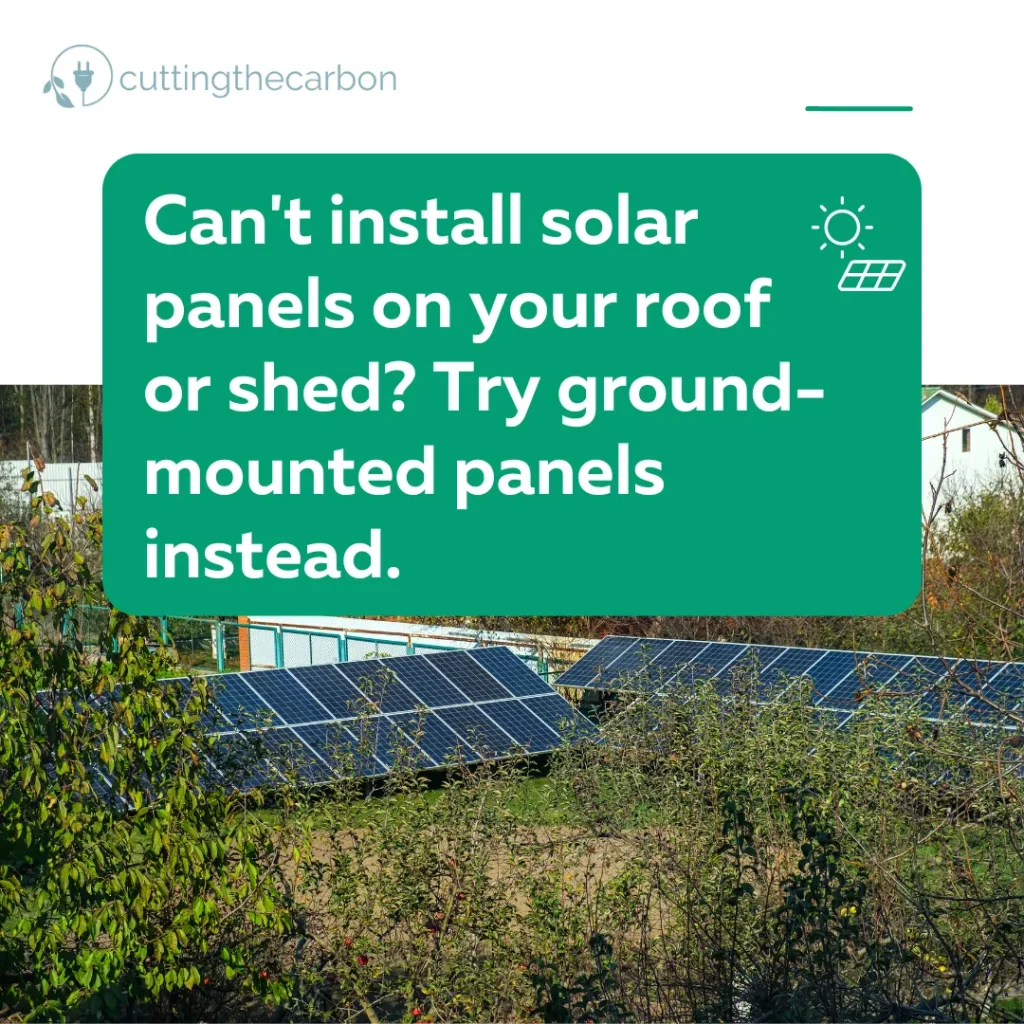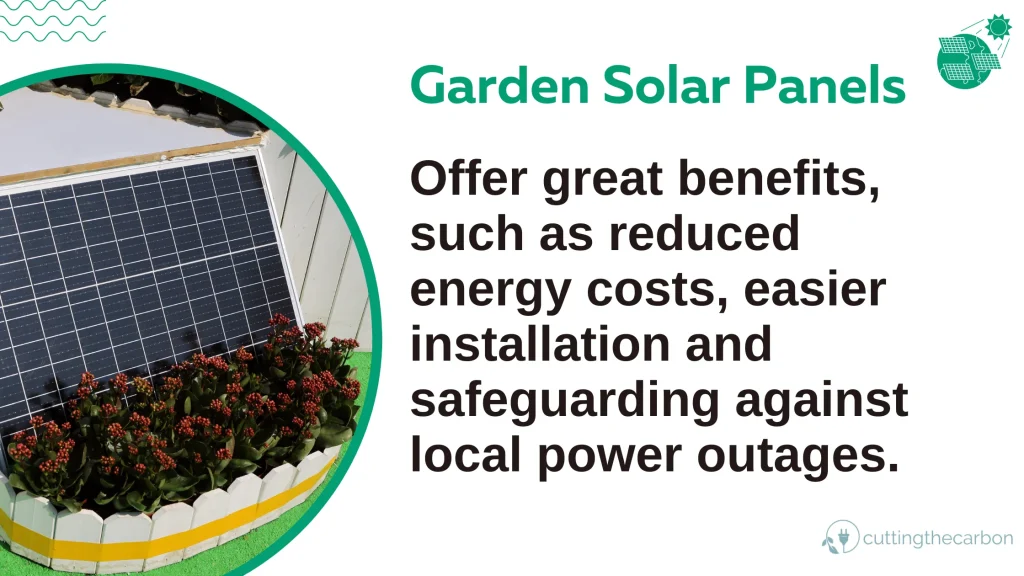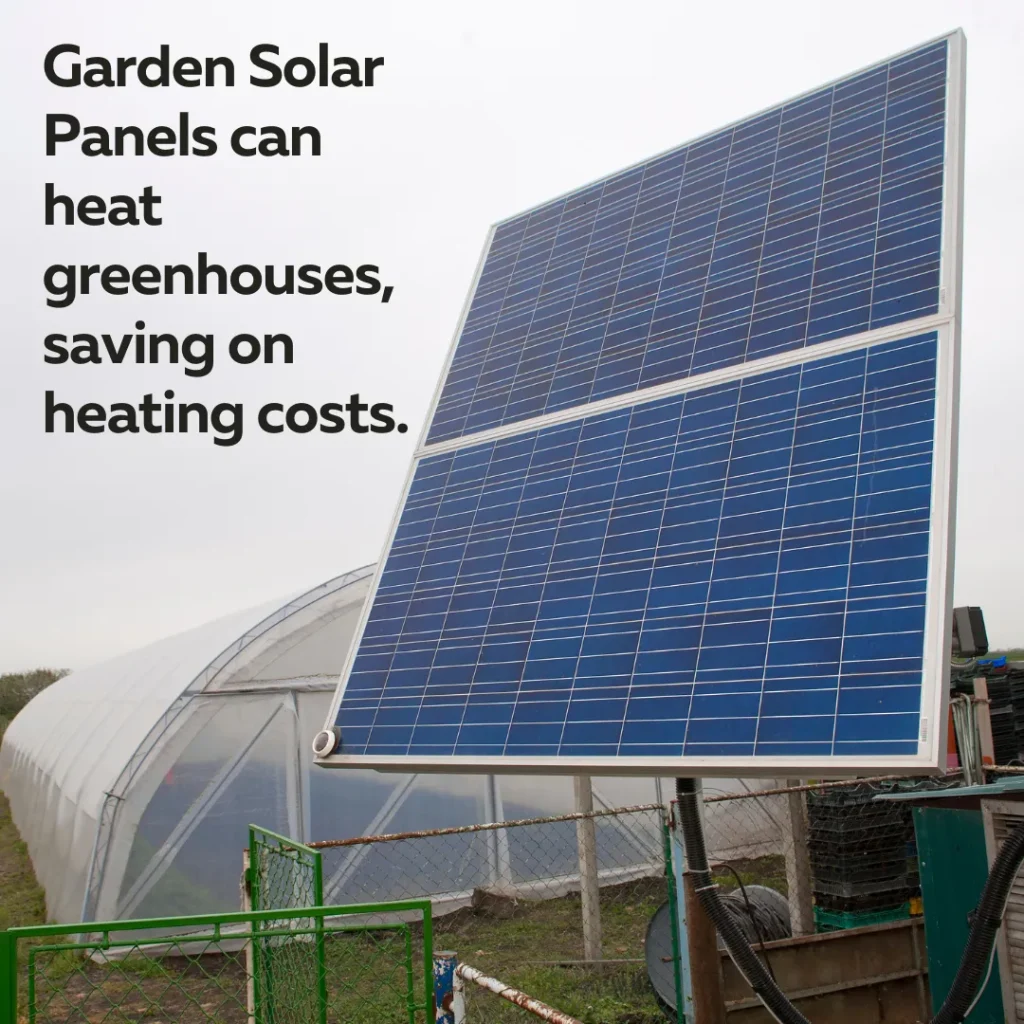Imagine harnessing the sun’s power to create a sustainable, environmentally-friendly oasis in your garden or backyard.
Garden solar panels offer just that, providing an exciting opportunity to generate your own clean energy while reducing your carbon footprint.
In this comprehensive guide, we’ll explore the various options for garden solar panels, discuss optimal placement and positioning, and share inspiring case studies and success stories.
From ground-mounted systems to shed installations and small panels for garden lights, there’s a solar panel solution for every homeowner. Let’s embark on this journey to a greener future together.
Short Summary
- Harness solar energy with garden solar panels and reduce energy costs.
- Position strategically to maximize production & reap the rewards of renewable energy.
- Invest in a cost-effective, quality installation for long-lasting benefits & low environmental impact.
Here is a helpful table summarising the benefits of garden solar panels:
| Benefit | Description |
|---|---|
| Free electricity | Solar panels on your garden shed can generate free electricity, reducing your energy bills |
| Zero emissions | Solar panels produce clean, renewable energy, reducing your carbon footprint |
| Easier set up | Installing solar panels on a garden shed can be easier than installing them on a house roof |
| Supplement an existing system | If you’ve run out of space on your property’s roof, adding panels to a garden shed can increase your solar capacity |
| Charge other green appliances | Solar panels on your garden shed can power other green appliances, such as an electric vehicle or a heat pump |
| Store emergency power | In areas prone to power outages, storing extra solar power from garden solar panels can be useful |
| Ground-mounted solar panels | If you can’t have solar panels on your property’s roof or shed, you can install ground-mounted solar panels in your garden |
| Small solar panels for garden lights | Solar garden lights with small solar panels can light up your garden using energy from the sun |
| Heat a greenhouse with solar panels | Solar panels can be used to heat your greenhouse, reducing your carbon footprint and saving you money on heating costs |

Garden Solar Panel Options
Garden solar panels present a wide range of options catering to every homeowner’s lighting needs, transforming your garden into a renewable energy hub. Whether you’re a keen gardener or simply looking to reduce your energy bills, garden solar panels are an excellent choice.
We’ll dive into the details of ground-mounted systems, shed installations, and small panels for garden lights, so you can determine which option is most suitable for your property.
Ground-mounted systems
Ground-mounted solar panel systems offer a fantastic opportunity to harness the sun’s energy and slash your energy bills. These systems are installed directly on the ground, making them more accessible and easier to install than rooftop systems.
Ground-mounted solar panels provide flexibility in their placement, allowing you to choose the most efficient location on your property, unlike rooftop systems that are limited by roof features.
To maximize the efficiency of your ground-mounted system, consider investing in tracking features.
Tracking systems, such as single or dual axis tracking, automatically tilt your ground mounted solar panels to capture the maximum amount of sunlight throughout the day, increasing overall production by up to 25% or more.
The Cornish Rocker system, for example, is an adjustable ground-mounted system that enables you to fine-tune and adjust the pitch of your array for optimal energy generation, promising outstanding performance and great value.
Shed installations
Shed installations offer another exciting option for garden solar panels. Installing solar panels on the roof of a shed can lower heating costs and emissions while providing a reliable emergency power up source in case of power outages.
Additionally, shed installations can expand your solar capacity when your property’s roof space is limited.
For maximum efficiency, aim for a roof angle of about 35 degrees when installing solar panels on a shed. The installation process typically requires two or three panels measuring roughly 1.6 square meters.
The cost of installation will depend on the number of panels, wattage, and any additional features, so it’s highly recommended to compare quotes from different installers to get the best deal.

Small panels for garden lights
Small solar panels for garden lights are compact, efficient, and affordable, perfect for powering charming garden lights without taking up too much space. These panels generate electricity from sunlight during the day, efficiently charging the batteries.
When it gets dark, the energy stored in these batteries powers the LED lights, creating a magical ambience in your garden.
From fairy lights and lamps to ornaments, there’s a wide range of solar-powered garden lights available to suit your taste.
Optimal Placement and Positioning
Optimal placement and positioning are crucial for maximizing the energy production of your garden solar panels. Factors such as south-facing orientation, avoiding shading, and site assessment are vital in ensuring your solar panels generate as much electricity as possible.
By carefully considering these factors, you can make the most of your solar panel system and reap the benefits of renewable energy.
South-facing orientation
A south-facing orientation is essential for garden solar panels, allowing them to receive the most direct sunlight and maximize their energy production. Aim for an angle between 30 to 40 degrees to achieve optimal results.
Ensuring that your own array of solar panels faces south and is positioned at the ideal angle will significantly increase their efficiency and productivity.
Avoiding shading
Shading can have a detrimental impact on the power output of your solar panels. Nearby buildings or trees can block sunlight from reaching your panels, reducing their efficiency.
Even partial shading of one cell on a solar panel can decrease its power output, so it’s crucial to be aware of this issue when choosing the location for your garden solar panels.
If shading is unavoidable, installing bypass diodes can help minimize its impact on your system. Bypass diodes isolate shaded cells, preventing them from affecting the entire system.
By considering shading and implementing solutions like bypass diodes, you can ensure your solar panels operate at their peak efficiency.

Site assessment
A site assessment is essential in determining the optimal location for your garden solar panels.
Evaluating factors such as the amount of sunlight the area receives, the angle of the panels, and the amount of shade in the chosen location ensures that your solar panels are installed in the most efficient and productive manner.
A thorough site assessment provides a reliable foundation for informed decision-making, maximizing the benefits of your solar panel system.
Heating Greenhouses with Solar Panels
For gardening enthusiasts, heating greenhouses with solar panels can save money while reducing your carbon footprint. Connecting your solar panels to an electric heating system can create a warm and nurturing environment for your plants, even during colder months.
Embrace the power of the sun and watch your plants thrive in a sustainable, eco-friendly greenhouse.
Solar Panels for a Hot Tub or Jacuzzi: A Quick Estimate
The number of solar panels required to run a hot tub or Jacuzzi depends on various factors such as the power consumption of the hot tub, the wattage of the solar panels, and the amount of sunlight in your location.
Generally, a typical hot tub might require anywhere from 4 to 6 standard solar panels (each around 300 watts), but it’s best to consult with a solar energy professional to determine the exact number for your specific situation.
Garden Solar, The Rules And How UK Law Works (Video Guide)
Installation Process and Costs
The installation process and costs for garden solar panels are similar to rooftop arrays. However, you can invest in tracking features that can increase electricity production, making your solar panel system even more efficient.
To ensure that you get the best value for your investment, it’s crucial to compare quotes from different suppliers.
Comparing quotes
Comparing quotes from different solar panel suppliers is essential for getting the most suitable and cost-effective deal for your installation. Reviewing quotes from various suppliers ensures you receive the highest quality product and service for your money.
Don’t hesitate to shop around and compare quotes to secure the best deal for your garden solar panel system.
Additional features
Garden solar panels come with a range of exciting additional features, such as adjustable angles for optimal sunlight exposure, weatherproofing, adjustable mounting systems, and integrated monitoring systems.
These features enhance the efficiency and functionality of your solar panel system, providing you with a comprehensive renewable energy solution for your garden.
Case Studies and Success Stories
Garden solar panels have transformed numerous gardens into sustainable havens, showcasing the benefits of renewable energy.
For instance, a 2.47 kW solar PV installation in Torbay, a 14 kWp solar panel installation in Staines-Upon-Thames, and a ground-mounted garden solar panel system in Cornwall system have all been incredibly successful.
These inspiring case studies demonstrate the potential of garden solar panels to reduce carbon footprint and save money on energy bills. Check out our useful carbon footprint calculator to better understand your overall carbon contribution over one year.
Homeowners who have embraced garden solar panels enjoy numerous advantages, including lower energy costs, reduced emissions, and a reliable source of clean energy. With a lifespan of up to 25 years, garden solar panels offer long-lasting benefits and contribute to a greener future.
The Impact of Solar Panels on UK Property Valuations
Do solar panels affect the valuation of homes in the UK? Yes, they do. A growing number of studies suggest that homes equipped with solar panels tend to have higher property values, thanks to the increasing demand for energy-efficient properties among UK buyers.
Summary
Garden solar panels offer a versatile, efficient, and environmentally friendly solution for homeowners looking to harness the power of the sun.
With various options, such as ground-mounted systems, shed installations, and small panels for garden lights, there’s a solar panel solution for every garden.
By carefully considering factors such as south-facing orientation, avoiding shading, and site assessment, you can maximize the efficiency and benefits of your garden solar panel system.
Not only will you save money on energy bills and reduce your carbon footprint, but you’ll also be contributing to a sustainable, greener future for generations to come.
Frequently Asked Questions
Can you put solar panels in your garden?
You can make great use of your garden space by purchasing and installing solar panels.
A quick check of the sun exposure and a few fittings could help you reduce your reliance on the grid and save money on energy bills – all while taking advantage of this green energy source.
Can I put solar panels in my garden without planning permission?
In most cases, you should be able to install solar panels in your house or garden without planning permission. However, some local restrictions may apply, so it’s best to check with your Local Planning Authority first.
They will be able to provide you with the necessary information for any additional requirements.
Can you put solar panels on a garden shed?
Yes, solar panels can be successfully installed on garden sheds. The installation process is generally relatively straightforward, and you can often take advantage of optimal sun exposure to maximise the efficiency of your panels.
Can I heat my shed with solar power?
Yes, you can heat your shed with solar power! With the right setup, you can easily transform your shed into a fully-functioning garden building where light, warmth, and modern electronics reign supreme.
Making the switch to solar power is relatively simple, and it comes with a whole host of eco-friendly benefits.

